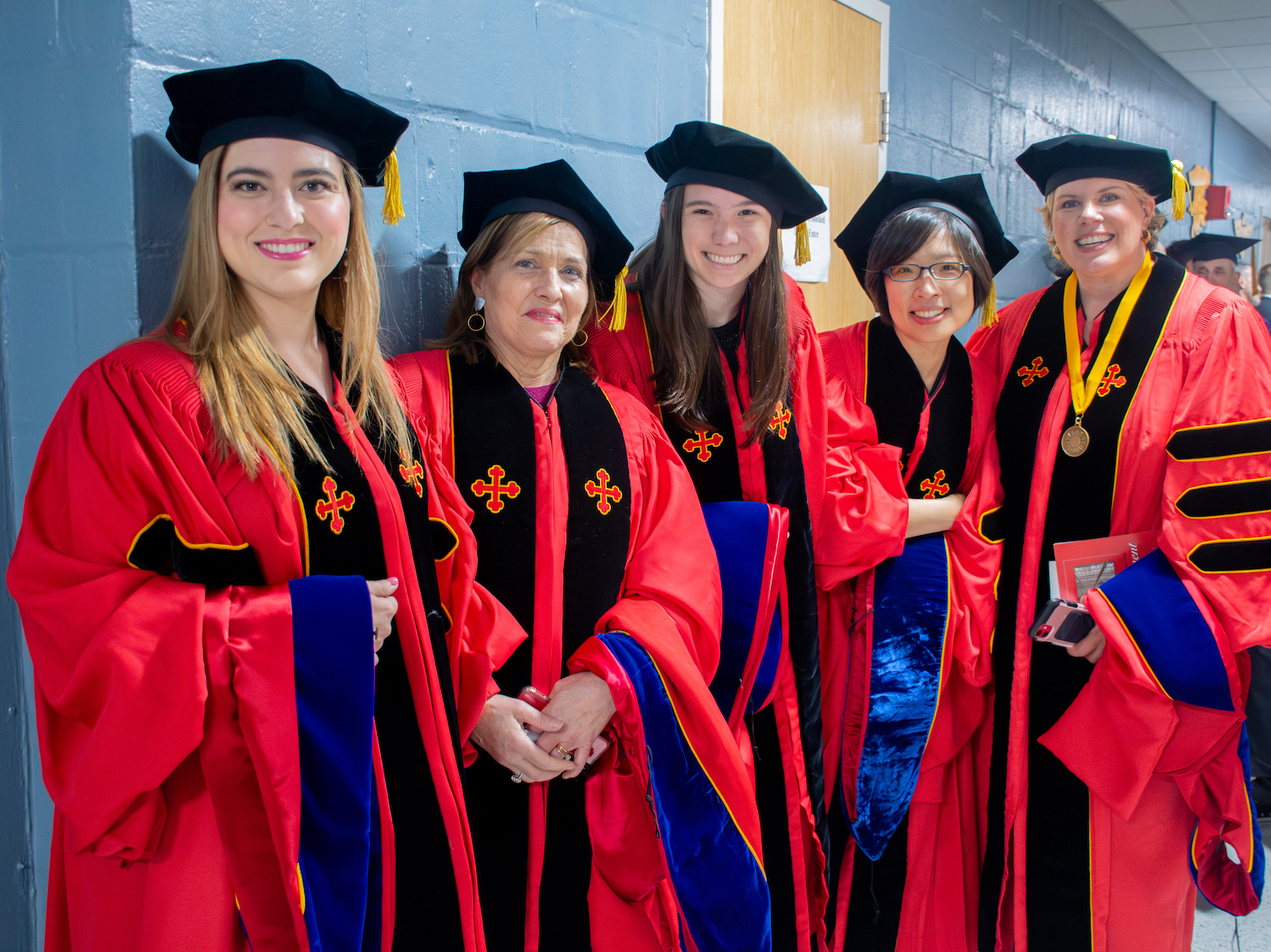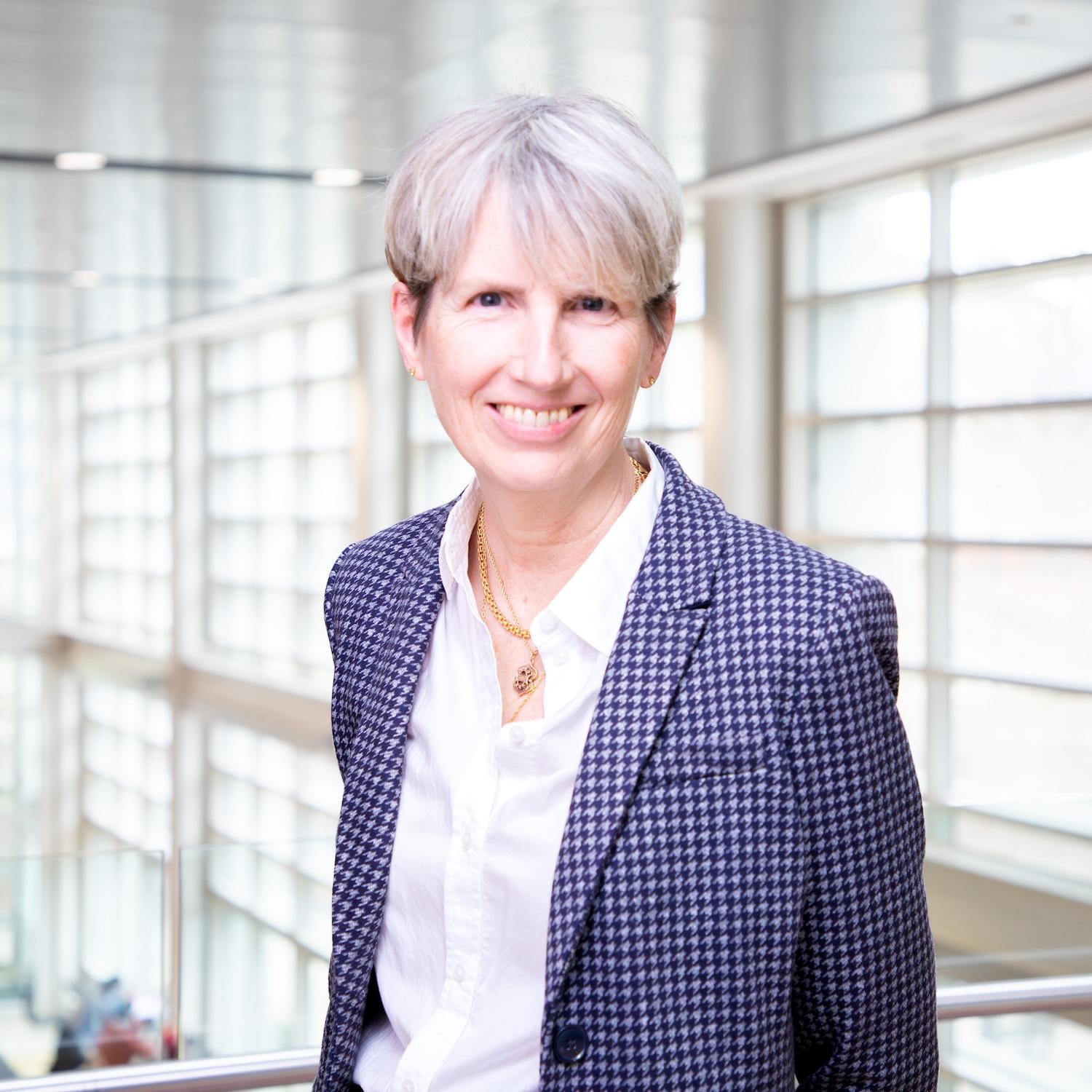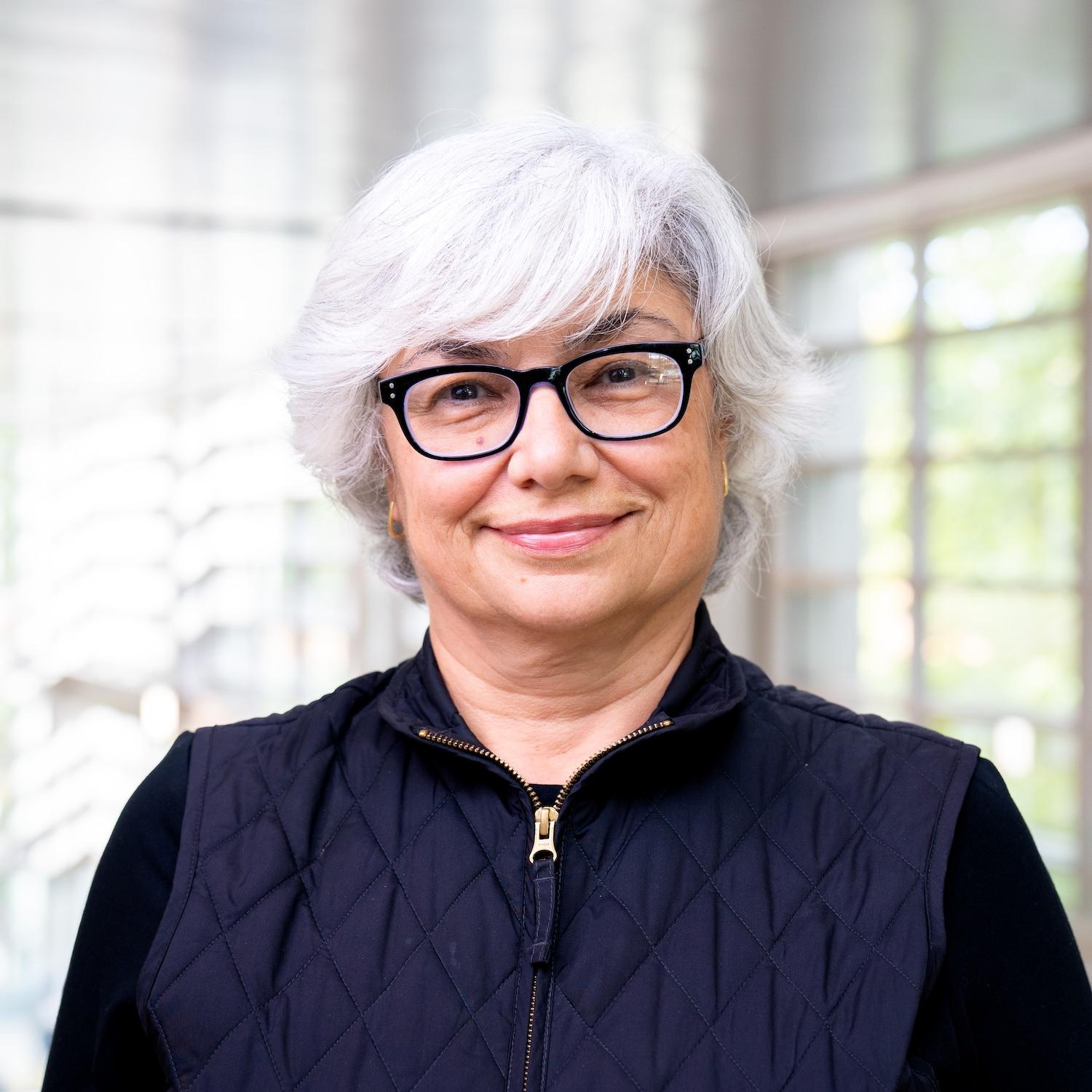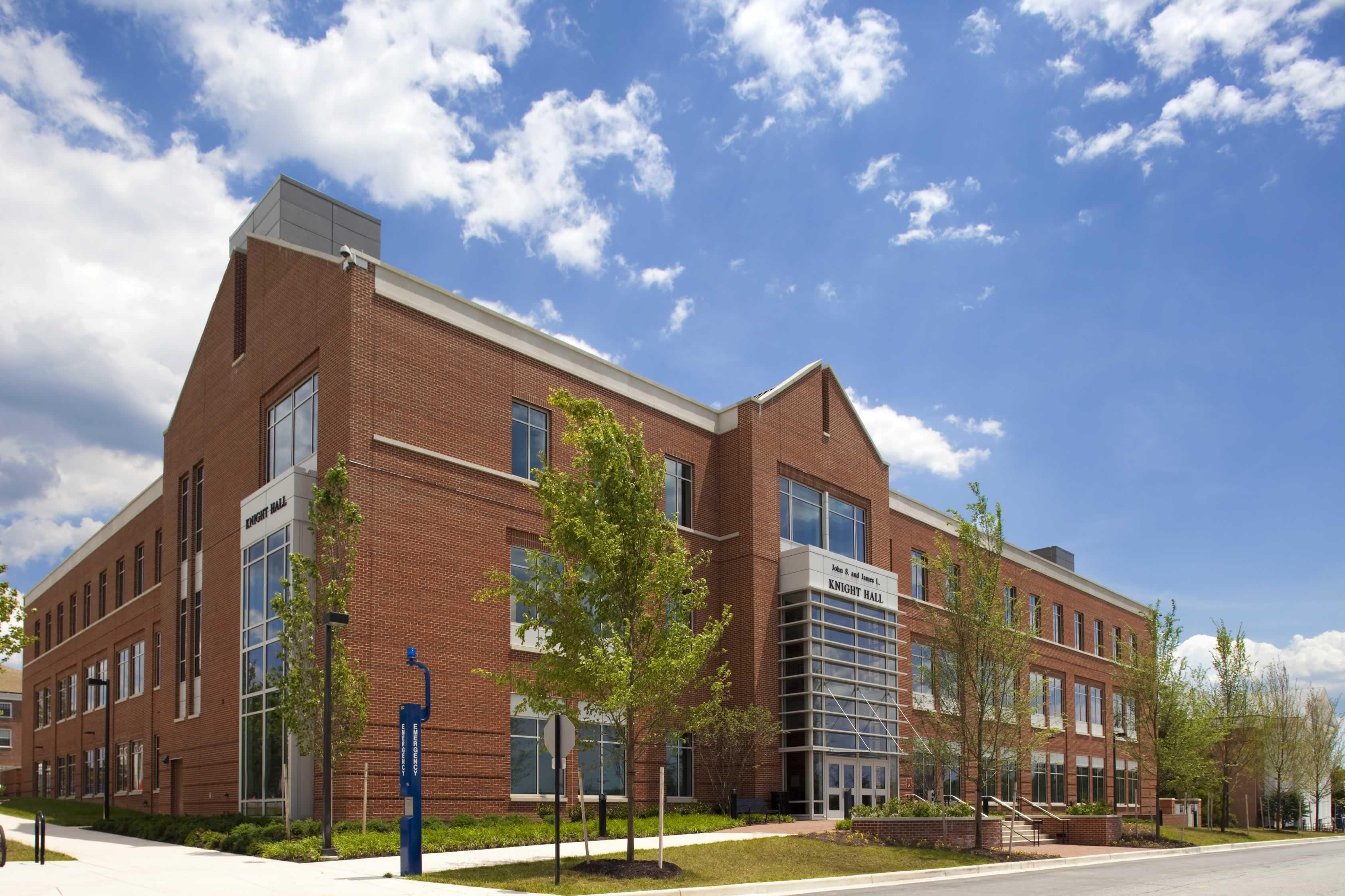Ph.D. Program
Want to become a journalism professor? Merrill is the program for YOU!
Ph.D. students at Merrill engage in cutting-edge scholarship with renowned faculty to research the many dimensions of journalism (data journalism, political communication, social media, gender and media history, to name a few). Merrill doctoral students also tap a network of colleagues across the campus of the University of Maryland including those from information studies, communication, political science, history, sociology, psychology and public policy.
 You’ll become a key component in the research and teaching environment at Merrill College, sharing your expertise with undergraduates, co-publishing with faculty, and presenting your work at national and international conferences.
You’ll become a key component in the research and teaching environment at Merrill College, sharing your expertise with undergraduates, co-publishing with faculty, and presenting your work at national and international conferences.
Merrill Ph.D. students are very successful in their careers, with many going on to tenure-track positions in academia when they graduate.
Merrill students should plan on completing their Ph.D. within four years. Our graduates now work in academia, the media or government agencies.
The Ph.D. in Journalism Studies program has three phases:
At least 36 credit hours are required, including:
- Nine credit hours (minimum) of required research design and methods courses. Two of the three methods courses should be taken as early as possible to establish a foundation for a variety of research methodologies.
- JOUR775 — Quantitative Methods
- JOUR776 — Qualitative Methods.
- A third methods course in or outside the College
- Eighteen credit hours (minimum) of journalism courses including:
- JOUR601 – Theories of Journalism (or equivalent if taken for a master’s or other program)
- JOUR610 – Seminar in Mass Media History
- JOUR800 – Introduction to Doctoral Study
- JOUR801 – Advanced Public Communication Theory
This includes journalism elective courses (numbered 600 or above) offered by College. Elective credit can include an independent study in or outside the College with approval by the Director of Ph.D. Studies.
- Nine credit hours in your cognate
- Cognate courses numbered 600 or above are taken from another department on campus or a combination of departments that relate to your research interest. If you prefer to take cognate courses from different departments you must justify in writing the relationship of those courses to your research.
- Courses numbered 400 require the permission of the Ph.D. director.
By the time you complete your courses, you should have selected an advisor plus a committee of at least three additional faculty members to complete your written and oral comprehensive exams.
After successfully completing your written comprehensive exams, you will prepare a formal proposal for unique research with guidance from your advisor. You formally present your written proposal to your dissertation committee for feedback and approval. After completing your research, the committee assembles again for the defense of your work and results.
More About Merrill's Ph.D. Program
The Philip Merrill College of Journalism is a professional school dedicated to two missions: First, to educate and train students to become leaders of the news business in print, television/radio and online journalism. Second, to prepare scholars of distinction whose published works and critiques will advance the standards and practices of journalism, and our understanding of the news media and its influence on society.
These missions are complementary; together, they embrace the larger purposes for which the American free press was created: to assist the public and its leaders to receive the kind of reliable information essential for the functioning of the democracy.
In offering a Ph.D. in Journalism Studies, the University of Maryland provides scholars and journalistic practitioners a unique opportunity to study the workings of the media and assess its effect on society in the news center of the world. Intellectual resources on the Maryland campus alone offer a rich menu for scholars at a university and a journalism college that take pride in striving for the broadest application of the indispensable principle of diversity in its students, its faculty, and its course offerings.
Among the highly regarded university programs available for Ph.D. candidates to explore are such subjects as American studies, women’s studies, information technology, public policy, sociology and a wide range of specialty areas covering the fields of business, the sciences, environmental policy, and studies relating to concerns affecting women, the family, race and minorities. In addition to these advantages, the capital area forms a unique laboratory for examining the professional functioning of journalism practiced by the most numerous and diverse domestic and foreign news organizations operating anywhere. It also presents an opportunity for scholars to take advantage of the unrivaled archival/historical resources available here through such institutions as the National Archives, the Library of Congress, the National Public Broadcasting Archives and Library of American Broadcasting (located on the University of Maryland campus), numerous museums, galleries, national “think tanks,” as well as the principal government agencies and departments, the courts, the branches of Congress with their multiple fact-gathering committees and subcommittees, and the interest groups, political consultants, and pollsters all seeking to influence the legislative process and the way issues are portrayed in the media.
With this as background, the Philip Merrill College of Journalism envisions its Ph.D. program as being focused on, but not restricted to, a broad range of general subjects for study. Among them: Media and Society. Media and the Family. Media and Minorities. Media and Gender and Ethnicity. Media and the Presidency. Media and Government and Politics. Media and the Law. Media and Science and Technology. Media and Business and the Economy. Media and Foreign Affairs. Media and Public Opinion. Media and the Military.
The College also sees its Ph.D. program as being created to fulfill the following critical needs:
- To bring together professional journalists and academic media specialists and teach them to speak the same language. At present, each side tends to talk at cross-purposes. Too often, the journalists are so busy “doing their job” that they lack sufficient time to reflect on what that job is or should be and thus fail to assess adequately the strengths and weaknesses of contemporary journalism in order to improve its standards and ethics. At the same time, too often the academics engage in research that confirms the obvious, thus providing little practical utility, and write in language that is needlessly abstruse. Some scholars offer radical critiques of the commercial media system and the First Amendment under which it operates. Maryland’s Ph.D. program is designed to help bridge this gap between the professionals and the academics and indeed to force engagement between the practitioners and the scholars in hopes that each side will gain insights from exposure to the other.
- To provide a wide range of coursework that acquaints students with various theories of journalistic practice while emphasizing the most rigorous standards of scholastic inquiry. At the same time, the college offers Ph.D. candidates a strong component of history, political science and social science research that makes use of the area’s resources. In furtherance of these goals, the college stresses coursework on the literature and philosophy of journalism that emphasizes the basic relationship among the media, the government and society. Essential to realizing this goal is coursework that exposes scholars to archival/historical research techniques and emphasizes scholarly research methodologies. Another strong component emphasizes the vital role of cross-cultural journalism and examines how well, or poorly, journalistic presentation of art, drama, film, books, sports, religion, and cultural manners, mores, values and attitudes affect or reflect the wider society.
- To prepare media teachers and critics who will become leaders in training and influencing future generations of journalists and whose published works will stimulate critical examination of the media. Merrill faculty have published widely on critical elements of journalism in society, including work by Prof. Mark Feldstein on the rise of Washington’s scandal culture; Prof. Susan Moeller on terrorism and conflict coverage, Prof. Sarah Oates on the internet and social change; and Prof. Linda Steiner on women and the media.
- To prepare students to explain the American media system to the world in a way that goes beyond merely defending or criticizing it, and helps provide insight into how the media affects the formulation of foreign and domestic policy. In furtherance of this goal, the College actively seeks to attract international scholars interested in studying the workings of the American media as well American students with a primary interest in foreign affairs and policy.
To achieve these doctoral goals, the Philip Merrill College of Journalism is committed to strive for excellence in the professional and scholarly credentials of its faculty, its scholastic standards, its coursework, and its mission to elevate the principles and practice of journalism.
Merrill College’s Ph.D. graduates find tenure/tenure-track positions and other jobs all over the U.S. and around the world.
- Wenyou Aaron Ye '25: Assistant Professor in communication, Worcester State University
- Dinfin Mulupi '24: Assistant Professor, University of Colorado, Boulder
- Sohana Nasrin '24: Instructor, Communication, University of Tampa, Florida
- Frankie (Ho Chun) Wong '24: Assistant Professor, Lingnan University, Hong Kong
- Alison Burns '23: Lecturer, Philip Merrill College of Journalism; Director of the College Park Scholars Media, Self, and Society Program, University of Maryland
- Bobbie Foster '23: Assistant Professor, Journalism & Strategic Media, University of Arkansas
- Wei-Ping Li '23: Post-Doctoral Research and Adjunct Lecturer, Philip Merrill College of Journalism, University of Maryland; and Research Fellow, Taiwan Factcheck Center
- Shannon Scovel '23: Assistant Professor of Sports Communication at the University of Tennessee
- Carolina Velloso '23: President's Postdoctoral Fellow at the Hubbard School of Journalism & Mass Communication at the University of Minnesota
- Denitsa Yotova '23: Instructor, Journalism and Media Studies, University of Nevada, Las Vegas
- Hazel Feigenblatt-Rojas '22: Programs Director for Latin America and the Caribbean, Institute for War & Peace Reporting
- Carole Lee '22: Program Coordinator, College Park Scholars Media, Self, and Society Program, University of Maryland
- Andrew Otis '22: Associate Editor, Analytics, The Chronicle of Higher Education
- Nandikoor R. Prashanth Bhat ‘20: Assistant Professor of Journalism and Media Studies, University of Texas, Houston
- Hoa Nguyen ‘20: Head of Digital Information Division, Ho Chi Minh City’s Department of Information and Communications, Vietnam
- Rachel Buchanan O’Hare '20
- Karin Assmann '19: Assistant Professor, College of Journalism and Mass Communication, University of Georgia
- Brooke Auxier '19: Research Manager, Deloitte Center for Technology, Media and Telecommunications
- Jason Scanlon '19: News Director & Producer, Fox News
- James Gachau '18: Theology Teacher, Boston College High School
- Justin Hudson '18
- Andrew Nynka '18: Editor-in-Chief, The Ukrainian Weekly and Svoboda
- Boya Xu '18: Senior UX Researcher, Amazon
- Saranaz Abdollahzadeh Barforoush '17: Assistant Professor of Teaching, The University of British Columbia, Vancouver
- Pallavi Guha, '17: Associate Professor, Department of Mass Communication, Towson University
- Joanna Nurmis '17: Press Attachée, French Embassy in Estonia
- Stanton Paddock '17: Ministère de l'Éducation et de l'Enseignement supérieur du Québec (MEES)
- Allissa Richardson '17: Associate Professor of Journalism and Communication, Founding Director of the Charlotta Bass Journalism and Justice Lab, University of Southern California Annenberg School for Communication and Journalism
- Yacong Yuan '17: Adjunct Assistant Professor, Communications Studies Program, University of Maryland Global Campus
- Tetyana (Tanya) Lokot '16: Associate Professor, School of Communications, Faculty of Humanities and Social Sciences, Dublin City University, Ireland
- Saswat Pattanayak '16: Blogger and Journalist
- Rob Wells '16: Associate Professor, Philip Merrill College of Journalism
- Michael Koliska '15: Associate Professor, Communication, Culture & Technology, Georgetown University
- Robbie Morganfield '15: Executive Director, Ida B. Wells Society for Investigative Reporting, Morehouse College
- Merrilee Cox '14: Adjunct Lecturer, Philip Merrill College of Journalism
- Stine Eckert '14: Associate Professor, Department of Communication, Wayne State University
- Jacqueline Incollingo '14: Associate Professor of Communication, Rider University
- Raymond McCaffrey '14: Assistant Professor and Director of the Center for Ethics in Journalism, University of Arkansas
- Klive Oh '14: Associate Professor, Communication Division, Pepperdine University
- Elia Powers '14: Associate Professor, Department of Mass Communication, Towson University
- Woody Woodruff '14
- John Davis (as Sergei Golitsynskiy) '13: Software Engineer, Schatz Lab, Johns Hopkins University
- Jing Guo '13: External Affairs Officer, The World Bank
- Jeff Lemberg '13: Retired Associate Professor, Department of Communication, Curry College
- Jessica Roberts '13: Assistant Professor, Faculty of Human Sciences, Universidade Católica Portuguesa, Lisbon
- Kevin Swift '13: Department Chair, Mass Communications, Methodist University (Fayetteville, North Carolina)
- Matthew Bates '12: Retired Assistant Professor of Communications, Trinity Washington University
- EunRyung Chong '12
- Mihee Kim '12
- Eric Easton '11: Professor of Law Emeritus, University of Baltimore School of Law
- Arielle Emmett '11: Freelance writer, consultant, and editor
- Sonia Pedrosa Pereira '11: Associate Professor, Associação Carioca de Ensino Superior, Rio de Janeiro
- Lindsey Wotanis '11: Associate Professor and Broadcast Journalism Program Director, Marywood University
- Ira Chinoy '10: Associate Professor Emeritus, Philip Merrill College of Journalism
- Megan Fromm '10: Education Manager, National Association for Media Literary Education
- Shuling Huang '10: Associate Professor, Department of Communication and Technology, National Chiao Tung University, Taiwan
- Priyanka Matanhelia '09: Project Manager, Flamingo Consulting Group (Mumbai, India)
- Wenjing Xie '09: Associate Professor of Journalism, Southern Illinois University Carbondale
- Chunying Cai '08: Media Production Professional, Washington, D.C.
- Marlene Cimons '08: Adjunct Professor, Philip Merrill College of Journalism
- Ray Gamache '08: Retired Assistant Professor of Mass Communication, Kings College
- John Kirch '08: Associate Professor, Department of Mass Communication, Towson University
- Paul Mihailidis '08: Professor of Civic Media and Journalism and Special Advisor to the Provost, Emerson College
- Indira Somani '08: Former Associate Professor of Broadcast Journalism, Howard University; Filmmaker and Team Leader for Equity and Representation, New Day Films
- Carlos Agudelo '07: Professor, Universidad de Antioquia in Medellin, Colombia
- Natalie Hopkinson '07: Associate Professor of Media, Democracy & Society, American University
- Norm Lewis '07: Associate Professor of Journalism, University of Florida
- Tracy Lucht '07: Associate Professor, Greenlee School of Journalism and Communication, Iowa State University
- Svetlana Markova '07: Communications Office, The World Bank
- Jad Melki '07: Chairperson, Communication Arts Department, Lebanese American University
- Bu Zhong '06: Journalism Professor, Penn State University
- Tamara Henry '05: Former Adjunct Professor, Philip Merrill College of Journalism
- Stacy Spaulding '05: Professor and Department Chair, Towson University
In Memoriam
- Ronald N. De Munbrun '17: Career civil service employee and Vietnam War veteran
Important Links
Fellowships & Awards
Each requires a student letter and/or faculty nomination to the Ph.D. director.
Michael Gurevitch Journalism Scholarship
Professor Emeritus Michael Guerevitch taught at the University of Maryland’s College of Journalism from 1983 to 2008, during which time he worked on original research on how journalists grasped the practical problems of keeping the public informed. The Michael Gurevitch Journalism Scholarship is awarded to one Ph.D. journalism student.
Eligibility: As stipulated by the donor, this award shall be used to provide annual non-renewable scholarships to a Ph.D. student at Merrill College with financial need, with a preference for an international student. Submit a letter explaining your request to the Ph.D. director before the deadline.
Professor Thomas J. Aylward Scholarship
The Professor Thomas J. Aylward Scholarship is awarded to one journalism Ph.D. student who demonstrates financial need.
Eligibility: As stipulated by the donor, the selection is based "on a combination of potential success and financial need." This scholarship was established as a tribute to Professor Aylward, the former chair of the University of Maryland's Department of Communication Arts and Theater and former director of the Division of Radio, TV, and Film before it was separated from the college. Submit a letter explaining your request to the Ph.D. Director before the deadline.
Ray Hiebert History of Journalism Award
This award reflects the interest of Professor Ray Hiebert, founding dean of the University of Maryland College of Journalism and himself a historian. The scholarship provides an annual award to any graduate student or faculty member at the Philip Merrill College of Journalism who writes the best material on any aspect of American journalism history.
For More Information

Susan Moeller


